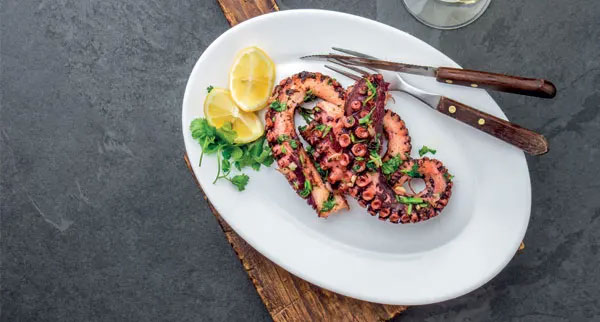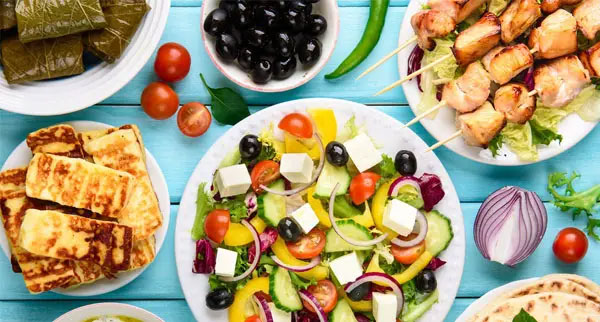Sell Greece and Cyprus’ culinary side with Laura French’s guide to the best dishes in the region.
Click here to download and save as a PDF.
There are certain places in the world that just seem to have been made for foodies – where leaving without having to loosen the belt a notch (or better still, buy a whole new wardrobe) is nothing short of sacrilege.
Greece and Cyprus are two of those places, with dishes to suit every taste bud under the (almost year-round) sun. Here, we’ve put together a list of some of the best, with recommendations on where to book for clients wanting to try them in authentic surrounds – cue creamy moussakas in old tavernas, rich mezze dishes in warm, welcoming cities, and freshly-made sweets in remote little villages.
Kleftiko
Tender, melt-in-the-mouth lamb falling off the bone, fluffy potatoes and sweet, juicy vegetables, slow-cooked together and infused with a rich white wine sauce – kleftiko is akin to heaven in the foodie stakes.
“The dish dates back 200 years, when kleftes (mountain thieves) would steal lamb and cook it in an underground fire-pit.”
The dish dates back 200 years, when kleftes (mountain thieves) would steal lamb and cook it in an underground fire-pit; today, it’s a staple on menus across Greece and Cyprus. For clients wanting to go back a step, suggest the Annabelle hotel in Paphos, which offers cooking classes for guests wishing to learn how to make the dish, along with its traditional accompaniment, tzatziki.
Halloumi
Halloumi is the food of the moment, but we’ve been a tad slow to catch on – Cyprus has been producing it since the 1500s. For those wanting to sample it at its freshest, the tourist board recommends Droushia, a quaint, stone-built mountain village just outside Paphos, where travellers can visit dairy farms to try it hot off the press, or enjoy it grilled on a skewer in one of the many olde-worlde restaurants which overlook the idyllic, rolling scenery.

Loukoumades
Cyprus knows how to do sweet, and among its most iconic delicacies are loukoumades – fried, doughnut-like balls traditionally smothered in honey syrup, cinnamon and walnuts and served at roadside stalls across the island. For clients looking to try them at their most inventive, suggest Honey Tokens in Nicosia, where toppings include Nutella and ice cream, or LoukouMan in Limassol, which throws marmalade and strawberry cream into the mix.
Soutzoukos
Heard of this one? Possibly not. Translated as “grape juice rolls”, these chewy Cypriot sweets are especially popular around the wine villages thanks to an abundance of grapes. They’re made from almonds or walnuts sewn onto a cotton thread, which is then dipped in moustos – grape extract heated and flavoured with rosewater (the process can take several days, with each layer having to dry before another can be added). You’ll find them in villages around Paphos and Limassol.
“Among the most famous dishes from the region are dolmades – stuffed vine leaves with rice, lamb, mint and lemon juice.”
Souvlaki
Greek food wouldn’t quite be what it is without souvlaki, grilled meat skewers served in pitta and sold on the street with a dollop of cooling, minty tzatziki. “It’s the most famous Greek street food and is packed with flavours,” says Chatzopoulos George, executive chef at Aldemar Resorts, whose properties in Crete, Rhodes and Olympia offer guests the chance to make it themselves with cooking classes for every level.
Dolmades
Middle Eastern influences are everywhere you look in Greek cuisine thanks to centuries of movement between the two. Among the most famous dishes from the region are dolmades – stuffed vine leaves with rice, lamb, mint and lemon juice. You’ll find them all over, but for some of the best suggest Athens, where traditional taverna Myrtia serves them up with a sharp kick.

Grilled octopus
Greece excels on the seafood front and grilled octopus done well is up there with some of the very best. Sunvil recommends the Liotopi Hotel in Halkidiki for clients wanting to make it themselves (free for guests) in the company of welcoming owner Loulou, who guides you through it step by step and serves it with dried figs and honey. “Everyone loves this dish, which is inspired by the Ancient Stagira,” she says.
“This hearty combination of lamb, potatoes, fried aubergine and wobbly béchamel sauce is at the heart of traditional Greek cuisine.”
Moussaka
No list would be complete without mentioning moussaka, whose hearty combination of lamb, potatoes, fried aubergine and wobbly béchamel sauce is at the heart of traditional Greek cuisine. Simply Luxury by Travel 2 recommends Daios Cove Luxury Resorts & Villa in Crete for those wanting to try it; guests can have a go at cooking it themselves in a workshop, or sample it at the Taverna, which serves local specialities with a side of opal blue ocean.
Sample product
A week’s half board in a deluxe seaview room at Daios Cove Luxury Resorts & Villa in Crete costs from £1,219 per person including transfers and flights on May 11, 2019.
travel2.com
Seven nights’ half board at the Liotopi Hotel with Sunvil costs from £801 per person including a cooking demonstration, return flights and transfers.
sunvil.co.uk

Other foodie experiences
Columbia Beach Resort in Pissouri, Cyprus, offers free culinary demonstrations with a Michelin-trained chef, who teaches guests all about the resort’s dishes and inspirations.
Urban Adventures offers an Extreme Bites food tour in Athens, where adventurous types can sample the likes of Cretan snails, patsas (tripe soup) and atherina (small fried fish) served in a cone.
Trafalgar features a Greek dinner on a family-run olive and wine farm in Olympia as part of its seven-night Best of Greece trip, complete with traditional dancing and other entertainment.
Read more
Singapore for foodies: You won’t go hungry
Foodie tours in Asia
Latin America: 10 of the best food and drink experiences




